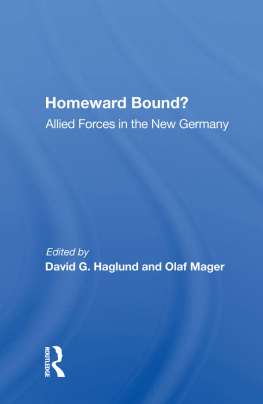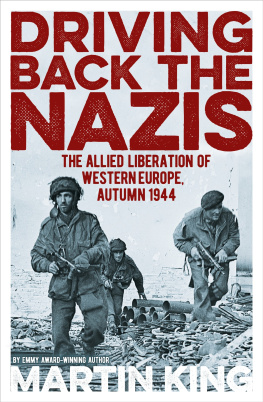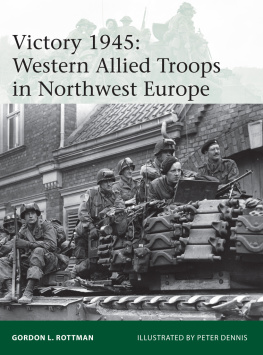For Fernand Welter
First published 1992 by Westview Press, Inc.
Published 2018 by Routledge
52 Vanderbilt Avenue, New York, NY 10017
2 Park Square, Milton Park, Abingdon, Oxon OX14 4RN
Routledge is an imprint of the Taylor & Francis Group, an informa business
Copyright 1992 Taylor & Francis
All rights reserved. No part of this book may be reprinted or reproduced or utilised in any form or by any electronic, mechanical, or other means, now known or hereafter invented, including photocopying and recording, or in any information storage or retrieval system, without permission in writing from the publishers.
Notice:
Product or corporate names may be trademarks or registered trademarks, and are used only for identification and explanation without intent to infringe.
Library of Congress Cataloging-in-Publication Data
Homeward bound? : Allied forces in the new Germany / edited by David G. Haglund and Olaf Mager.
p. cm.
ISBN 0-8133-8410-9
1. North Atlantic Treaty OrganizationArmed ForcesGermany. 2. GermanyMilitary policy. I. Haglund, David G. II. Mager, Olaf, 1959- .
UA646.5.G4H65 1992
355'.031'091821dc20
91-35778
CIP
ISBN 13: 978-0-367-01136-9 (hbk)
Whatever else they may disagree about, students of international security are unanimous in acknowledging the amazing transformations that have occurred in East-West relations since 1989. European security, in particular, seems to have been vaulted into a new era, the ultimate meaning and consequences of which can yet be only dimly discerned. On one matter, however, there is clarity: the most important structural underpinning of the former European security system, namely the presence of massed armies in both parts of a divided Germany, is disappearing. Although there has been much discussion of the challenge currently facing the Atlantic Alliance as it seeks to transform itself into a different and more "political" grouping of states, there has been surprisingly little discussion of the future of Western forces in the new Germany.
It is with that issue that this book is concerned. It can be taken for granted that until such time as the last Soviet soldier has marched out of Germany (probably in 1994, possibly sooner) the German government and German society will be willing enough to continue hosting foreign soldiers on their soil. It cannot be taken for granted, however, that a future German government will show itself so well-disposed to a continuation of what we term in this book the "stationing regime." Nor is it apparent that the stationing countries themselves will long remain committed to deploying forces in Germany. Many are the voices raisedand, let it be noted, not only in Germanyquerying the rationale of a continued stationing of foreign forces in the country that was once the "Central Front" in the political clash between the two great alliances of the Cold War. With this in mind, we have set ourselves three principal tasks in this volume: to trace the origins and evolution of the former stationing pattern; to discuss the policies and interests of all the actors immediately affected by troop stationing in Germany (namely the deploying states and the Germans themselves); and to sort out the possible reasons why European and North American states, notwithstanding the ending of the Cold War and the disappearance of the Soviet threat, might have an interest in prolonging foreign troop stationing in Germany and other European countries.
This project had its origins on a bus stalled in traffic in Italy. Both editors had been NATO Fellows during the 1989-90 academic year and had met at a conference on European security, organized jointly by the NATO Information Directorate and the Universit Libre de Bruxelles, in September 1990. The conference was held in the charming resort town of Sirmione, on the Lago di Garda. The extra time made available by our bus's slow progress on a field trip to Bologna enabled the two of us to get into a lengthy discussion of common research interests. That discussion, in turn, would lead to two subsequent joint endeavors.
The first of these was an authors' workshop, at which drafts of most of the chapters in this book were presented. That workshop was a collaborative project of the Stiftung Wissenschaft und Politik (SWP), the Free University of Berlin, and the Queen's University Centre for International Relations. It was held in April 1991 at the SWP in Eberihausen. Both of us were fortunate indeed to be able to work, in this initial stage, with Helga Haftendorn and her team of bright young researchers from the Free University's Center on Transatlantic Foreign and Security Policy. What followed was an intensive summer of work culminating in the early autumn in Kingston, where the editors got together to write the book's introductory and concluding chapters.
Cooperative ventures, especially those taking place across an ocean, necessarily require a lot of patience and support. Happily, the editors seem to have brought to the project bountiful, though not inexhaustible, stores of the former. Concerning the latter, they were luckier still, for they were able to count on the financial assistance and other contributions of numerous individuals and a few organizations. In particular, they should like to acknowledge the indispensable role played in this project by Fernand Welter, whose duties at NATO's Office of Information and Press have included liaison with universities. It was Dr. Welter who in two critical ways enabled us to carry out this project: first by having sponsored the Sirmione conference and then by having generously assisted in our fund-raising for the Ebenhausen workshop. It is to him that we dedicate this book.
Also deserving of our thanks for having facilitated our fund-raising for both the workshop and the volume are Alfred Schmidt, of the Volkswagen Stiftung; Joyce Agnew, of the Military and Strategic Studies Program of the Canadian Department of National Defence; and John Toogood, of the Canadian institute for international Peace and Security.
For having provided such an accommodating setting for the authors' workshop, we wish to express our gratitude to Michael Strmer, Director of the SWP. Others at the Stiftung who were instrumental in the success of that conference are Deputy Director Albrecht Zunker, Yvonne Badal, Sabine Jordan, and Thomas Bagger.
In Kingston, the job of preparing the manuscript was made considerably less burdensome by the good efforts and good cheer of all those associated with the technical operations of the Queen's Centre for International Relations. In particular, we should like to thank Kay Ladouceur and Marilyn Banting for their consistent dedication to this project. Valerie Jarus performed outstandingly in transforming our copy into typeset pages. And Mary Kerr assisted admirably with the manuscript preparation at critical junctures.












